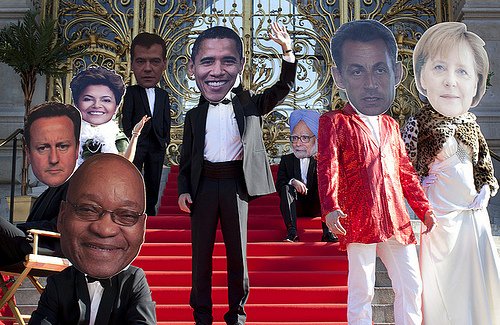
Oxfam activists dressed as world leaders © Oxfam International
Global warming negotiations are at an important fork in the road. With emerging signs of promising actions occurring on the ground and troubling signs in the atmosphere, countries must decide in Durban if they can turn standing ovations into guidelines and institutions to help all countries take serious action to reduce global warming pollution and improve their resilience to the impacts of global warming.
[This is Part 2 of a three part series of posts on the global warming negotiations in Durban. Part 1 discussed some emerging good news of action on-the-ground, troubling signs which confirm that we must act now, and how countries must be able to "multitask" in Durban. Part 3 will discuss the state of play on efforts to implement the Cancun Agreements.]
The key political issue that will dominate the overall narrative in Durban is around the "fate of the Kyoto Protocol" and "where we are headed".* These are two issues which were looming large in the lead-in to Copenhagen and Cancun but are set to come to a head in Durban. Getting greater clarity on these two issues will likely unlock progress on implementing the Cancun Agreements. While other issues are critical to build a strong international response to global warming (see Part 3) these two intertwined topics are likely to dominate much of the attention of Ministers.
"FATE OF THE KYOTO PROTOCOL"
At the end of 2012, the first round of internationally legally-binding targets for developed countries will end — developed country targets under the Kyoto Protocol run from 2008-2012. While major developed and developing countries explicitly committed to individual actions to reduce their global warming pollution, whether or not those targets will be enshrined in another "commitment period" of the Kyoto Protocol (e.g., from 2013-2017) is an open question.** A number of developed countries have passed domestic laws requiring mandatory emissions reductions beyond 2012, typically through 2020. For example, the European Union (E.U.) target to reduce emissions 20 percent below 1990 levels in 2020 is enshrined in the E.U.'s "Climate and Energy Package" which continues its mandatory emissions trading system for its largest polluters beyond 2012, mandates emissions reductions for each country in the E.U., and adopts other measures to reduce pollution across all 27 members of the E.U. Similarly the new Australia law sets out a path for targets beyond 2012. So for some countries, the "fate of the Kyoto Protocol" isn't fundamentally about whether they'll act at home beyond 2012, rather it is about how those targets are "codified" internationally. Developing countries (e.g., BASIC and African Union) have been explicit that their top priority in Durban is securing "a continuation of the Kyoto Protocol". The exact form of that "continuation" is under intense negotiation between the developing countries and the E.U.. The E.U. has stated that it would be willing to "politically" commit to a "second commitment period" if there was explicit agreement to negotiate a new legally binding commitment for all countries by 2015 (a so-called "mandate" or "roadmap"). Many expect countries like Norway and Switzerland to follow the E.U. Some countries have said pretty clearly that they won't go forward with further targets under the Kyoto Protocol (e.g., Japan, Russia, and Canada). Others like New Zealand and Australia haven't said one way or another.
It isn't clear whether developing countries will accept the EU's position or some modified version in the final hours. The E.U. has been extremely clear that it won't accept a continuation of the Kyoto Protocol without a clear mandate to negotiate a new international agreement which has firm actions from all the major emitters (see the conclusions from the E.U. Environment Ministers and from all 27 of the E.U. Heads of Government).
So key to resolving the "fate of the Kyoto Protocol" is for countries to outline a vision of "where we are headed (a "mandate" or "roadmap")?"
"WHERE ARE WE HEADED?"
Part of the package that is appearing would entail a commitment from all countries to outline where the global warming negotiations are headed – e.g., to a new legal agreement which covers all countries with meaningful commitments. While countries wouldn’t have to agree explicitly in Durban the exact form of the final new legal agreement, they would have to be prepared to negotiate with the explicit intention of moving to a new legal framework for all countries.
The E.U. has been very clear that for them this is a deal-breaker. Some countries believe that the E.U. will accept a continuation of the Kyoto Protocol without getting a clear mandate. The U.S. has said that they are prepared to accept a mandate to negotiate a new legal agreement but only if such a direction is explicit that all major emitters will have legally binding commitments. The Chinese and Indians have resisted such an explicit direction at this stage. Will countries move from these stated positions in order to get other pieces of the puzzle – such as a continuation of the Kyoto Protocol and implementation of the Cancun Agreements (see Part 3)?
Hoping that the E.U. wil "blink" and accept a continuation of the Kyoto Protocol without a mandate is a dangerous assumption. The issue of "where we are headed" was a key issue in the lead-in to Copenhagen. The thinking going into Copenhagen was that we would agree to "one agreement, two steps" – with the second step being a new legally binding framework. That second step has eluded the world since Copenhagen as there is no clarity on where we are headed.
This issue is shaping up to come to a head in Durban. It can't be punted or dodged this time. We need a resolution.
COUNTRIES MUST MOVE FROM STATED POSITIONS TO REAL AGREEMENT
It is appearing like we won't know what will be acceptable on the "fate of the Kyoto Protocol" and "where are we headed" until the very last moment in Durban. There are many, many variations that are emerging in the “corridor discussions”. High-level policymakers will have to decide the fate of these two key issues. Agreement in Durban to implement the Cancun Agreements hinges on resolution of these major political issues.
It is time for countries to stop digging in their heels and start moving towards a new international agreement with firm commitments from all major emitters. Is any country prepared to stand alone and block agreement?
It is time to decide.
So will the key agreements in Cancun be translated into guidelines and institutions to help deliver real change on-the-ground? The next post will detail where things stand on that front and how those pieces can move forward in Durban.
*This is an update of the current state of play from a post at the lead-in global warming negotiations held in Panama.
** Reports have emerged that countries are only looking to a legally binding commitment for their targets beyond 2020 has generated some pushback from some of the most vulnerable countries and some clarifications from key countries.


